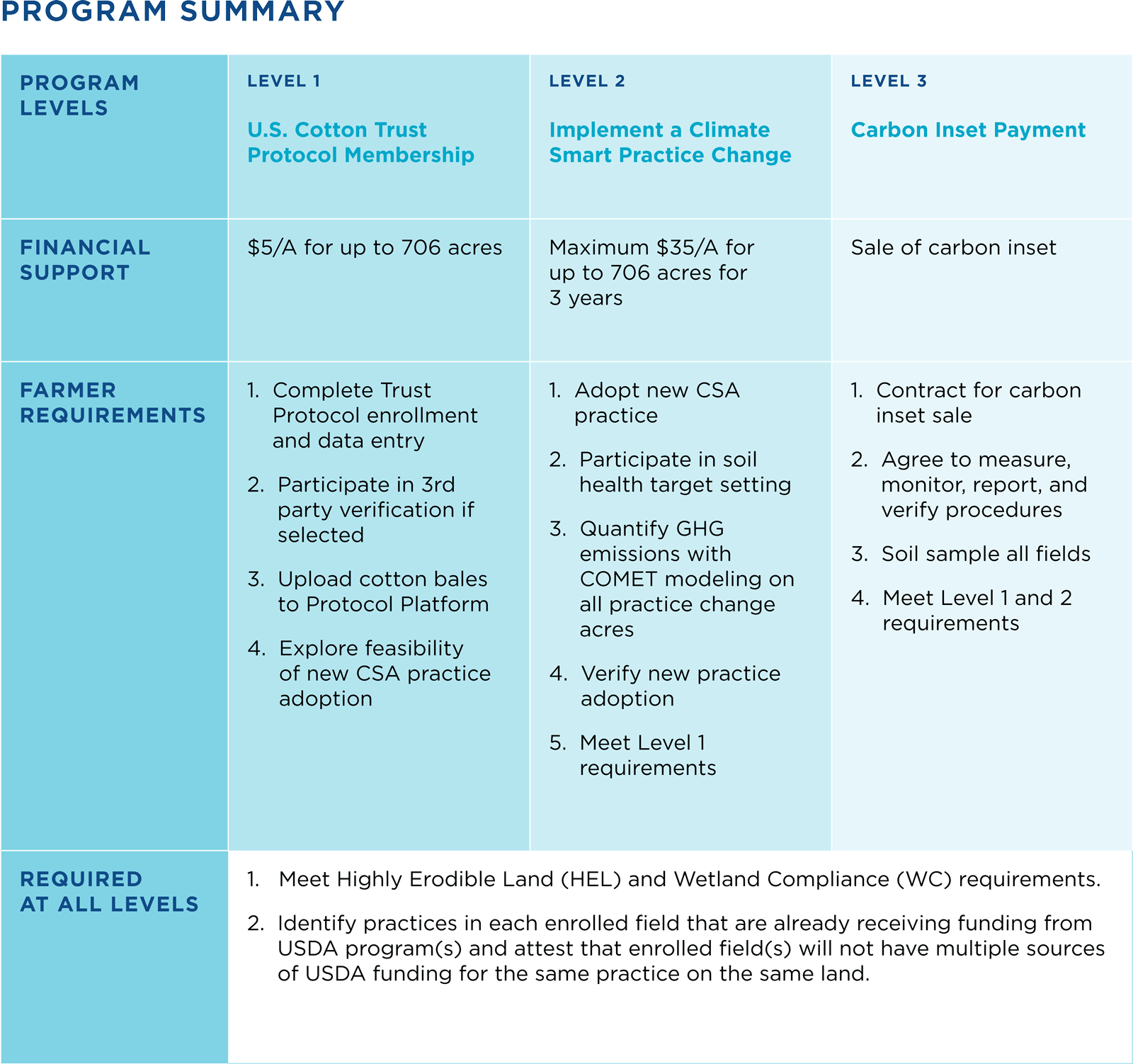
Frequently Asked Questions
The Climate Smart Cotton Program, led by the U.S. Cotton Trust Protocol, presents a transformative opportunity for U.S. cotton growers, offering a range of benefits that go beyond sustainability. By joining this innovative initiative, growers can enhance their operations, profitability, and environmental stewardship, all while contributing to the long-term viability of the U.S. cotton industry.
For brands and retailers, the program will support efforts to reduce GHG emissions and allow reporting against Scope 3 emissions reductions for cotton used in products.
The Trust Protocol is proud to lead the U.S. Climate Smart Cotton Program which aims to measure and improve U.S. cotton’s carbon footprint. This program is one of the first projects to be announced and signed by the United States Department of Agriculture and Secretary Tom Vilsack, as part of the department’s Partnership for Climate-Smart Commodities pilot projects.
The Climate Smart Cotton Program is a five-year initiative that will build upon the four pillars of Climate Smart Agriculture (CSA) practices that support planting cover crops, reduced tillage, and nutrient management. This will allow for improved soil health, increased drought and flood resilience, advanced nutrient use efficiency, decreased soil erosion, and reduced GHG emissions.
The goals of the five-year program are to:
- Provide technical and financial assistance to U.S. cotton farmers
- Advance adoption of CSA practices on 1.2M U.S. cotton acres
- Produce 4.2M bales of Climate Smart Cotton™ over five years
- Enroll 1,650 U.S. cotton farmers, including 330 farmers from historically underserved
communities - Reduce CO2e emissions by 1.14M metric tons
The USDA defines CSA practices as activities that store carbon and improve resilience and soil health, such as reduced and no-till, cover crops, and prescribed grazing; reduce GHG emissions, including methane and nitrous oxide, using practices such as ruminant feed management, manure management, and fertilizer management.
In order to apply for the Climate Smart Cotton Program, growers must have completed their enrollment in the Trust Protocol, which includes entering field-level data and uploading bales.
Growers can visit TrustUSCotton.org to get started today to secure a spot in the program and maximize benefits. For assistance with enrollment contact info@trustuscotton.org.
The Climate Smart Cotton Program provides growers with participation level options that:
- Offer technical and financial support to de-risk implementation and adoption of Climate Smart Agriculture (CSA) practices
- Provide networks to ease transition and maintain profitability
- Help support input cost reduction, potential yield improvements, and enhance crop quality
- Enable opportunity to create and sell carbon insets to brands and retailers who are members of the Trust Protocol
In order to be eligible for an incentive payment as a part of the Climate-Smart Commodities, a producer must:
- Establish Farm Records with the Farm Service Agency (have farm, tract, and field numbers in place);
- Complete an AD-2047 (Customer Data Worksheet to facilitate the collection of
customer data for Business Partner Record); - Certify HELC and WC compliance via Form AD-1026, Highly Erodible Land
Conservation (HELC) and Wetland Conservation (WC) Certification; and - Certify that they are not a foreign person or entity
Growers are encouraged to work with their local USDA and FSA office to help determine eligible acres or acres that are already enrolled in other USDA programs. More information can be found at usda.gov.
Growers may also authorize a Trust Protocol representative to access these documents on their behalf by completing a release statement, which is available upon request at info@trustuscotton.org.
Each farming entity that can obtain a subsidiary report from the FSA is able to enroll 706 acres by providing FSA Farm, Tract, and Field ID.
We encourage growers to reach out to other Climate Smart Program leads to determine enrollment and acreage eligibility, as this pilot only focuses on U.S. cotton acres.
This project is a multi-stakeholder initiative that incorporates the knowledge and expertise of
supply chain outreach, academia and sustainability including: Cotton Council International, Cotton Incorporated, the Soil Health Institute, Texas A&M AgriLife Research, Agricenter International, Alabama A&M University, and North Carolina A&T State University.
Each partner offers unique, valuable knowledge and resources to growers that will aid as they advance through the program’s levels.
The Climate Smart Cotton Program launched in June of 2023, with the ambition to produce over 4 million bales of Climate Smart Cotton™ during the program’s five years.
Cotton is a commodity, with pricing determined by the market and sold through merchants. The Trust Protocol does not implement policies towards pricing of Protocol Cotton, U.S. Cotton or Climate Smart Cotton™.
Initial conversations with brands and retailers have started for how to best build the carbon component of the Climate Smart Cotton Program and better understand what reporting requirements brands need in terms of carbon insets.
Additional information will be provided as the program matures.
The aim of Climate Smart Cotton™ is for the fiber to be produced with a lower carbon footprint through the implementation and adoption of CSA practices. While some of these practices are considered ‘regenerative’ Climate Smart Cotton can’t be marketed as Regenerative Cotton as there is no certification for Regenerative Cotton.
The Trust Protocol’s supply chain tracking begins at the initial fiber uptake. While a brand and retailer cannot know specifically what individual farm the cotton is from, all Climate Smart Cotton™ is grown by verified Protocol growers who have pledged a commitment to sustainability and worker well-being.


